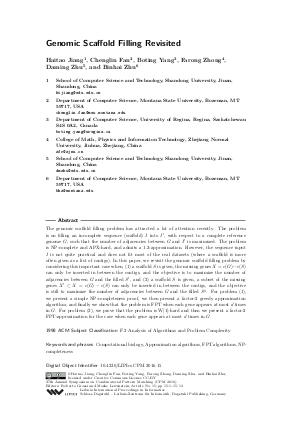Genomic Scaffold Filling Revisited
Authors Haitao Jiang, Chenglin Fan, Boting Yang, Farong Zhong, Daming Zhu, Binhai Zhu
-
Part of:
Volume:
27th Annual Symposium on Combinatorial Pattern Matching (CPM 2016)
Part of: Series: Leibniz International Proceedings in Informatics (LIPIcs)
Part of: Conference: Annual Symposium on Combinatorial Pattern Matching (CPM) - License:
 Creative Commons Attribution 3.0 Unported license
Creative Commons Attribution 3.0 Unported license
- Publication Date: 2016-06-27
File

PDF
LIPIcs.CPM.2016.15.pdf
- Filesize: 444 kB
- 13 pages
Document Identifiers
Subject Classification
Keywords
- Computational biology
- Approximation algorithms
- FPT algorithms
- NP- completeness
Metrics
- Access Statistics
-
Total Accesses (updated on a weekly basis)
0Document
0Metadata
Abstract
The genomic scaffold filling problem has attracted a lot of attention recently. The problem is on filling an incomplete sequence (scaffold) I into I', with respect to a complete reference genome G, such that the number of adjacencies between G and I' is maximized. The problem is NP-complete and APX-hard, and admits a 1.2-approximation. However, the sequence input I is not quite practical and does not fit most of the real datasets (where a scaffold is more often given as a list of contigs). In this paper, we revisit the genomic scaffold filling problem by considering this important case when, (1) a scaffold S is given, the missing genes X = c(G) - c(S) can only be inserted in between the contigs, and the objective is to maximize the number of adjacencies between G and the filled S' and (2) a scaffold S is given, a subset of the missing genes X' subset X = c(G) - c(S) can only be inserted in between the contigs, and the objective is still to maximize the number of adjacencies between G and the filled S''. For problem (1), we present a simple NP-completeness proof, we then present a factor-2 greedy approximation algorithm, and finally we show that the problem is FPT when each gene appears at most d times in G. For problem (2), we prove that the problem is W[1]-hard and then we present a factor-2 FPT-approximation for the case when each gene appears at most d times in G.
Cite As Get BibTex
Haitao Jiang, Chenglin Fan, Boting Yang, Farong Zhong, Daming Zhu, and Binhai Zhu. Genomic Scaffold Filling Revisited. In 27th Annual Symposium on Combinatorial Pattern Matching (CPM 2016). Leibniz International Proceedings in Informatics (LIPIcs), Volume 54, pp. 15:1-15:13, Schloss Dagstuhl – Leibniz-Zentrum für Informatik (2016)
https://doi.org/10.4230/LIPIcs.CPM.2016.15
BibTex
@InProceedings{jiang_et_al:LIPIcs.CPM.2016.15,
author = {Jiang, Haitao and Fan, Chenglin and Yang, Boting and Zhong, Farong and Zhu, Daming and Zhu, Binhai},
title = {{Genomic Scaffold Filling Revisited}},
booktitle = {27th Annual Symposium on Combinatorial Pattern Matching (CPM 2016)},
pages = {15:1--15:13},
series = {Leibniz International Proceedings in Informatics (LIPIcs)},
ISBN = {978-3-95977-012-5},
ISSN = {1868-8969},
year = {2016},
volume = {54},
editor = {Grossi, Roberto and Lewenstein, Moshe},
publisher = {Schloss Dagstuhl -- Leibniz-Zentrum f{\"u}r Informatik},
address = {Dagstuhl, Germany},
URL = {https://drops.dagstuhl.de/entities/document/10.4230/LIPIcs.CPM.2016.15},
URN = {urn:nbn:de:0030-drops-60791},
doi = {10.4230/LIPIcs.CPM.2016.15},
annote = {Keywords: Computational biology, Approximation algorithms, FPT algorithms, NP- completeness}
}
